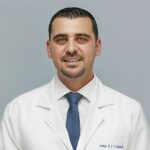Now, when we experience hair loss, Black dermatologists are researching and offering possible solutions. We talked to four about the latest options, from supplements to serums, lasers, and more. Read on to learn more about the breakthrough treatments they are working on, who they might work best for, and what’s on the horizon.
Bright Solutions with Laser Therapy
For many years, Dr. Jeanine Downie of Image Dermatology® P.C. has been at the forefront of hair growth advancements, making significant contributions to the field through her expertise and innovative treatments.
She has seen breakthrough after breakthrough over the last ten years, particularly with the introduction of supplements like Nutrafol and super products like Lambdapil (a hair density shampoo and lotion that revitalizes and nourishes thinning hair, most effective when paired with the Nutrafol) DefanAge®. This 150K hair serum thickens the density of the hair follicle.
Dr. Downie has also championed KeraLase™, a cutting-edge hair restoration therapy that uses Lutronic™ LaseMD® Ultra laser technology and KeraFactor® serum application. The Lutronic LaseMD® laser opens up the hair follicles on the scalp, which helps to optimize absorption. This prepares the skin for the KeraFactor® hair growth serum, which contains growth factors and proteins that promote thicker, fuller hair.
KeraLase™ treatments are completed over several months to boost optimal hair growth. Still, some patients have seen significant results “typically within three treatment sessions, compared to PRP (Platelet-Rich Plasma injections), which could take six or more.” “KeraLase™ is good for all skin and hair types and regrows hair significantly,” adds Dr. Downie.
It has shown effectiveness for several types of hair loss, including androgenetic alopecia (female pattern baldness), traction alopecia, and stress-related hair loss. Additionally, KeraLase™ is more expensive than other treatments because of the laser component, running approximately $1,000 per treatment session.
Beyond the in-office treatments, Dr. Downie stresses the importance of practicing “good scalp and hair health habits” to see maximum results. Consultation is key. Dr. Downie evaluates each patient individually to determine if laser therapy is the best option (or at all) and if other therapies or a combination of treatments (laser, medications, topical) is the best approach.
Getting to the Root of the Problem
Dr. Valerie Callender, Medical Director and Founder of Callender Dermatology and Cosmetic Center, is known for her sensitive and innovative approach to managing hair loss in African American women. Widely respected for her leadership role with the Skin of Color Society, Dr. Callender shares that a necessary breakthrough in getting to the root cause of hair loss in our community is ‘finding out the Why?’
Dr. Callender considers new developments in research critical to understanding patients’ genetic predispositions, which is critical to treating hair loss.
Cicatricial Alopecia (CCA) is the most common form of alopecia seen in African American women. In-depth genetic studies, family history identification, and testing for other comorbidities represent the holistic approach Dermatologists are using to identify the root cause of a patient’s hair loss.
Next comes treatment. Research partnered with new diagnostic tools, like dermatoscopy, has helped determine what type of hair loss a patient is experiencing. This non-invasive tool, also known as a Trichoscope, examines the scalp and hair shaft closely to identify the specific type of hair loss or alopecia so that the proper treatment can follow. Lastly, there’s been an uptick in Doctors pairing oral minoxidil with topical minoxidil prescriptions for maximum results.
Dr. Callender is dedicated to demystifying hair loss by assuring her patients that treatment is available. “Hair loss can be treated with the diagnosis approach of a Board-certified Dermatologist; don’t give up.”
New Hope For Hair Loss
Dr. Crystal U. Aguh, Associate Professor of Dermatology and Director of the Ethnic Skin Program at Johns Hopkins Department of Dermatology, is known for her profound research and numerous prestigious awards, including those from the Skin of Color Society.
With CCCA being the type of hair loss that affects black women almost exclusively, there have been some exciting breakthroughs and research happening over the past 5 to 10 years, shares Dr. Aguh.
Her research group identified topical Metformin as a potential treatment option for patients with CCCA. Metformin, typically used to treat diabetes, has been shown to not only be a safe medication overall but also work to improve scarring. Studies are ongoing to identify which oral medications work best when paired with topical treatment.
Supplements that have shown some effectiveness in men include Saw Palmetto, a male hormone blocker. However, it is still unclear how effective this supplement is in women. However, data supports the use of Rosemary Oil, proven to be as effective as 2% Minoxidil (generic name Rogaine), for non-scarring hair loss.
If you’re also looking for tech-savvy solutions, red light therapy might be an option to consider after all measures have been taken to preserve the overall health of your hair. Dr. Aguh advises that while these devices may stimulate hair growth, doing your homework first is key.
Overall, it’s important to note that everyone’s hair differs, and individual results may vary. It’s always a good idea to consult first with a board-certified dermatologist.
Expert Care – Expert Style
Dr. Achiamah Osei-Tutu & Master Natural Hair Care Expert Diane C. Bailey – Who wouldn’t want their own dream team dedicated to your hair health? That’s the superpower of the partnership between Dr. Achiamah Osei-Tutu of Osei-Tutu Dermatology and Master Hair Care Expert Diane C. Bailey.
Dr. Osei-Tutu shared some exciting new developments for patients with Alopecia Areata, using a class of medications called Jak Inhibitors. Jak Inhibitors, initially a medication for patients with rheumatoid arthritis, have been proven to prevent inflammation that can cause hair loss.
Dr. Osei-Tutu has also seen successful results with micro-needling treatments and laser-assisted delivery of medications, such as KeraLase™ and Alma TED, an ultrasound-based device offering a non-invasive treatment for hair growth.
However, after diagnosis, Dr. Osei-Tutu found that her patients needed support with the hair care part of their journey. “We wanted to [recommend stylists] who were knowledgeable about different diagnoses and non-tension hairstyles and had time to listen and care,” notes Dr. Osei-Tutu. That’s where Diane C. Bailey comes in.
Diane C. Bailey supports her clients in a private setting by teaching them the fundamentals of their hair care process. Scalp health AND hair health is Key! Bailey’s work is focused on cleansing, hydrating, and moisturizing the hair and providing a safe space for clients to share, build a trusted relationship, and collaborate on safe yet creative ways to protect and style their hair.
The dynamic duo also recently led a fireside chat at the Rooted in Wellness event hosted by Mane Moves, sharing their insights, resources, and invaluable advice to hair loss patients.
Take inspiration from these dermatology experts doing the work, making an impact in hair loss prevention and treatment and making it more inclusive.
Whether you are experiencing hair loss or simply looking for ways to keep your hair healthy, remember that knowledge is power, and the only way to embrace our personal hair journeys confidently is with the proper tools from trusted professionals.



